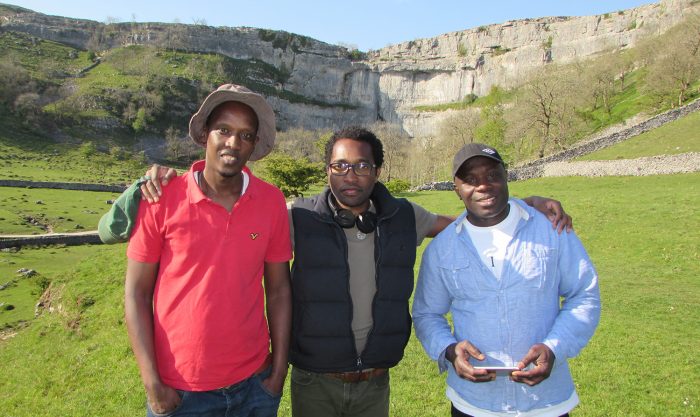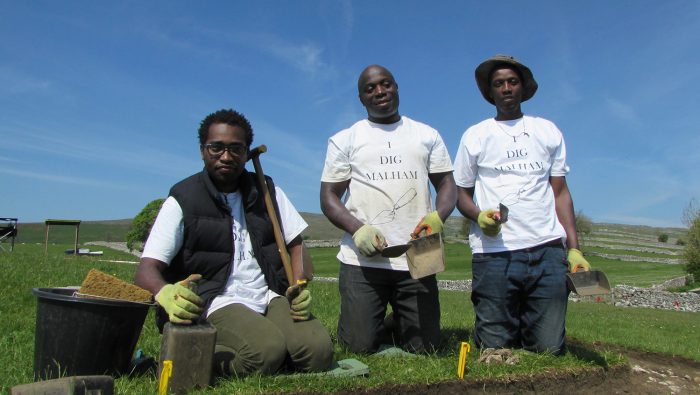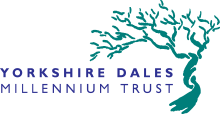Refugee Week 2021: We cannot walk alone
June 16, 2021
The theme of this years Refugee Week is: We cannot walk alone. It seemed like a great time to share some of the remarkable stories of people we have met – and often walked with – through our People and the DALES project.
Through the project we’ve provided over 10,000 visits to the Dales for a wide range of different groups, many of them refugee and asylum seekers.
Tinta has taken part in our Walk Leader Training weekend, archeological dig and lambing, and although he hasn’t been able to get the Dales for a while, it holds a special place in his heart! Tinta’s story below featured in our Walk with us booklet (you can order it from our shop). We recently caught up with him for an update.

“I was worth a fortune”
My name is Ali Tinta. I am from the Ivory Coast – it used to be the best country in the whole of West Africa – it was the economic powerhouse of the region growing coffee and cocoa. My dad started his own business importing and exporting cocoa and Peugeot cars, and by 1998 it employed 200 people. By 2002 it was valued at several million dollars. Then chaos and political turmoil arose. The Sassandra region began to experience ethnicity problems. Politicians were telling some people – ‘You are not true Ivorian.’ The South and North were in conflict. Dad was a northerner living in the south and was accused of being a traitor.
A snatch squad arrested him. There were 8 men. I can still remember their faces. They were not the police but army commandos. We gave them $83,000 but still they took him. He was shot three hours later. I was 13 and my life was turned upside down. It had been planned that I’d go to London to study, and then come back and take the keys to the business. Now I was taken by the military and accused of being a traitor. ‘You cannot charge me’, I said – ‘I am 13’. Luckily a French UN unit intervened and I was released. But, because I was the son of a murdered man they thought I would come after them. I became a master of disguises. I escaped because I was smart.
I was granted asylum in 2012 and now live in Blackburn. I have done lots of training and won several awards. Everybody knows me. I’m now at Blackburn College. I volunteer in the office at the Asylum and Refugee Centre and at the weekly Drop-In, and am a refugee champion with Blackburn YMCA New Beginnings project. Despite many challenges I want to support new refugees. I translate for Arabic and French speakers helping them in their case with the Home Office, and spend time talking to students in local schools about life as a refugee in a bid to spread awareness and break down barriers.

My first experience in the Yorkshire Dales was on an archaeological dig. A friend of mine had been an archaeologist and Museum curator in Eritrea, so the PaD team organised for a few of us to spend time with him on a dig alongside a local archaeology group. It was amazing.
Lambing was very good. In Africa we have sheep but they’re totally different. I’ve still got three colours of wool – purple, red and white – in my room in Blackburn. In Africa wool is shorter and very rarely used. I’ve seen a baby lamb being born. I was with my friend Charles from Senegal who had fled Africa. He is a doctor. They asked him, Charles have you ever delivered any babies – and he said “Yes about a thousand.” He helped deliver a lamb – I nearly fainted – it was emotional. I was born in the city. All part of the journey!
I took part in a Training weekend near Ribblehead where we learnt to read maps and use a compass. Map reading is so complex because the maps are very detailed. The little cross means the church and the altitude is in contour lines. Suddenly I’m reading it. If ever I find myself without any technology I will only need a map and I’ll find my way back home.
Every time I come to this area, I don’t want to go back. It’s up lifting! Very green and nice. To truly integrate you need to visit an area like this. People are generous and intrinsically kind. I’ve learnt a lot. The landscape is totally different from Africa and there’s the cold and the wind. I like the sheep. And I love the haymaking I really wanted to do it. In Africa we don’t make hay. Best day of my life was the day we spent haymaking. I took photos and sent them home. I’d always wondered why farmers made hay – I had not realised they needed to save food for the animals in winter. It was beautiful.
If you want to understand England, you’ve got to go to different regions, and meet different people. Don’t live in England without visiting Yorkshire. So many sheep. Climbing to the top of the Three Peaks. These are the things you can’t miss.
“Because of all the work I do my story is immensely powerful”
We caught up with Ali again in May 2021 to find out what he has been up to…
What are you doing at the moment?
At the moment I’ve been working with the YMCA to create a team called COVID champions. The aim is to try and recruit ethnic minorities and train them to raise awareness of the COVID vaccine, to try and overcome scepticism. I’ve also been involved in a film for the government’s integration team. The video will be used as mechanism to teach basic English as well as raising awareness about COVID and the importance of taking the vaccine. I also helped recruit another Refugee Doctor Arabic-speaking person to be filmed.
Tell me about your volunteering
I have been a volunteer now (working with refugees) for ten years in Blackburn. From 2020 until now I have never had to deal with such a complex and hard situation because of COVID. People have suddenly been confined in one place and the most difficult part is not being able to see people face to face. Most clients have my number and because offices were closed, I was bombarded with phone calls from people in desperate situations. I have done lots of online things to support people, or sometimes I have met people face to face. Some people were pushed out of temporary accommodation and had to find accommodation with friends. It’s a very unfair and complex situation. Food distribution has been especially difficult.
I do all of this work voluntarily because people need me. I have a lot of experience, I can speak many languages. I’m not shy – I’m an extrovert. Whatever happens I just go for it. Often I’m the middle man, trying to make life easier for the locals and refugees.
After a difficult year are you looking forward to going back to the Yorkshire Dales?
Definitely yes, you can’t say no to that question, especially if you’ve been before. I enjoy the quiet and tranquillity. Lockdown has been so difficult for people who live in the cities who cannot get to a park or haven’t got a garden. People living in city centre struggle.
What was your favourite experience in the Yorkshire Dales?
The leadership walk training was brilliant. I’ve done lots of things in the Dales, lambing, archaeology…but the walk training sets you free and gives you independence to go there on your own. I was in full control of my journey.
What are your plans and hopes for the future?
I was granted asylum in 2012 but this was taken back because they thought that it was by mistake – so I have now started a new application based on humanitarian grounds. This takes into account the length of time I’ve spent in the country (11 years now) and my contribution. Because of all the work I do my story is immensely powerful.
I have great respect for some people in this country, but not politicians, with exception to few. Despite all of the hatred and the negativity that refuges get, there are still good people. That’s gives me strength. That’s powerful. You cannot ignore it.
Find out more about People and the DALES – our award winning outreach project.
Find out more about Refugee Week






